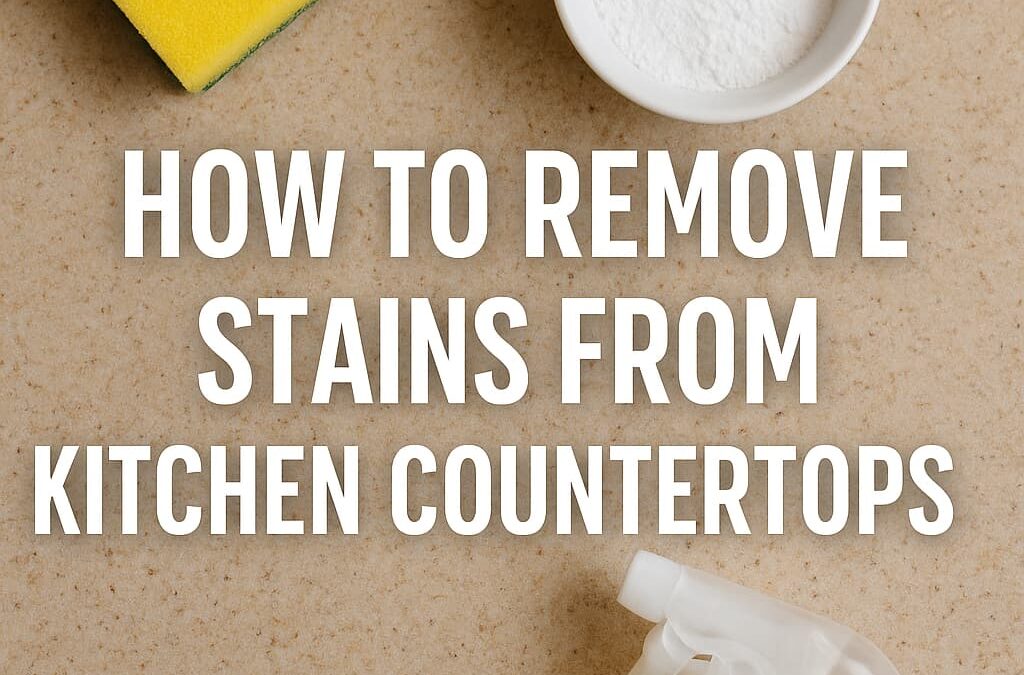Kitchen countertops are the hardest-working surfaces in any home. They take on coffee spills, wine splashes, oil stains, and even the occasional marker scribble. Over time, these accidents leave behind stubborn marks that make your counters look dull and dirty.
Here’s the good news — most stains can be removed with the right approach. You don’t always need harsh chemicals or expensive products. The trick is to match the cleaning method to the countertop material.
This guide shows you how to remove stains from different types of kitchen countertops, including granite, quartz, marble, laminate, and butcher block.
Key Takeaways
- Always identify the countertop material before choosing a stain remover.
- Use baking soda poultice for natural stone stains.
- Avoid acidic cleaners like vinegar or lemon juice on marble and granite.
- Disinfect quartz and laminate with mild cleaners — never bleach.
- For wood butcher block, sand and reseal if stains go too deep.
Why Do Kitchen Countertops Stain?
Countertops come in many materials, each with strengths and weaknesses. Natural stones like granite and marble are porous, so liquids seep in if not sealed. Quartz is non-porous but can discolor from strong chemicals. Wood absorbs oils and moisture easily, while laminate stains less but can still trap grime.
A 2023 Home Improvement Research Institute report found that 62% of homeowners experience countertop staining within the first three years of installation — most often from coffee, wine, and oil.
That’s why knowing your surface type matters before you start scrubbing.
How Do You Remove Stains From Granite Countertops?
Granite is durable but porous. Stains happen when sealant wears off.
Common Stains on Granite and Fixes
| Stain Type | Cleaning Method | Avoid |
|---|---|---|
| Oil (butter, olive oil) | Baking soda + water paste. Cover with plastic wrap overnight. | Vinegar, lemon juice |
| Coffee/Wine | Baking soda + hydrogen peroxide poultice. Leave 24 hours. | Bleach |
| Water Rings | Mix 50% isopropyl alcohol + 50% water. Wipe with microfiber cloth. | Abrasive pads |
Pro tip: Always reseal granite every 12–18 months. Without sealing, stains will return.
How Do You Remove Stains From Quartz Countertops?
Quartz is non-porous, making it resistant to stains — but resin in quartz can react to chemicals.
Safe Quartz Cleaning Steps
- Wipe daily with dish soap and warm water.
- For dried stains, use a plastic scraper to lift residue.
- For tougher stains, spray a mix of 50% water + 50% isopropyl alcohol.
Stains to Watch Out For
- Permanent markers → Rub with isopropyl alcohol.
- Grease → Use a degreaser labeled safe for quartz.
- Food coloring → Apply baking soda paste, let sit 15 minutes, then rinse.
❌ Never use bleach, oven cleaner, or strong acids. They cause discoloration.
How Do You Remove Stains From Marble Countertops?
Marble is luxurious but delicate. It etches easily from acids.
Stain Removal for Marble
- Wine or Juice → Baking soda + water poultice. Leave 24–48 hours.
- Oil → Apply cornstarch to absorb grease, then wipe.
- Rust → Use a marble-safe rust remover (oxalic acid based). Test first.
Avoid vinegar, lemon, or ammonia. These eat into marble and leave dull spots.
According to the Natural Stone Institute, 80% of marble surfaces show etching within the first five years when not cared for properly.
How Do You Remove Stains From Laminate Countertops?
Laminate is affordable and less porous, but it still stains from strong dyes or grease.
Cleaning Methods
- Coffee or Tea → Apply baking soda + water paste. Wipe gently.
- Ink or Marker → Dab with rubbing alcohol.
- Grease → Use dish soap with warm water, followed by a vinegar-water solution.
👉 Laminate is durable, but avoid strong abrasives. They can scratch and dull the finish.
How Do You Remove Stains From Butcher Block Countertops?
Wood countertops look great but need frequent care.
Safe Stain Removal
- Water Marks → Rub with equal parts vinegar and olive oil.
- Wine or Food Dyes → Sprinkle coarse salt, rub with half a lemon. Rinse and dry.
- Oil Stains → Apply cornstarch, let sit, then wipe away.
If stains are too deep:
- Sand the affected area with fine-grit sandpaper.
- Wipe clean.
- Re-oil with food-safe mineral oil.
💡 Pro tip: Oil butcher block every 3–4 weeks to prevent stains from setting.
What General Mistakes Should You Avoid When Cleaning Countertops?
- Don’t use acidic cleaners on natural stone (marble, granite).
- Don’t scrub with steel wool or abrasive pads on quartz, laminate, or marble.
- Don’t let spills sit — blot immediately.
- Don’t skip resealing on stone or oiling on wood.
FAQs
What’s the best natural cleaner for countertops?
Baking soda, vinegar (except on stone), lemon, and hydrogen peroxide are common options. Always check your surface type first.
Can bleach remove stains?
Bleach works on laminate but can damage granite, quartz, and marble.
How do I prevent stains in the first place?
Seal stone yearly, oil wood monthly, and wipe spills immediately.
Are countertop stain removers worth it?
Yes, if they’re labeled safe for your surface. Generic cleaners may do more harm than good.
Quick Stain Removal Checklist
- Identify countertop material.
- Use material-specific method (stone vs quartz vs wood).
- Always test cleaners on a small area first.
- Avoid acids on stone and bleach on wood.
- Seal or oil surfaces regularly for prevention.
Final Thoughts
Stains on kitchen countertops are frustrating, but they don’t have to be permanent. The key is knowing your surface and choosing the right method. For granite and marble, stick to poultices and resealing. For quartz, avoid harsh chemicals and rely on alcohol-based cleaners. For laminate, baking soda is your best friend. For butcher block, natural scrubs and regular oiling work wonders.
By following these safe techniques, you’ll not only remove existing stains but also protect your countertops from future damage. A little care today will keep your kitchen surfaces spotless and beautiful for years to come.

As the chief content writer, Hassan Al Sarker works as a professional kitchen-based content creator at Kitchen Liker.
In addition to reviewing the content published on Kitchen Liker, he ensures that it is accurate, relevant, and helpful. As a result, all the reviews and information published at Kitchen Liker are neutral and userfriendly.
Hassan Al Sarker has a bachelor’s degree in Hotel and Tourism Management From the Newyork University. Before joining Kitchen Liker, he was a contributor at Kitchen Club, United States.

